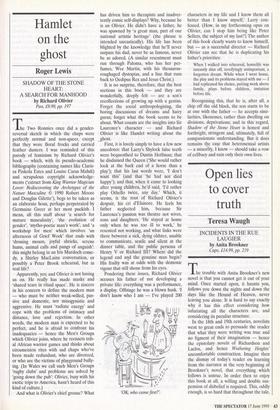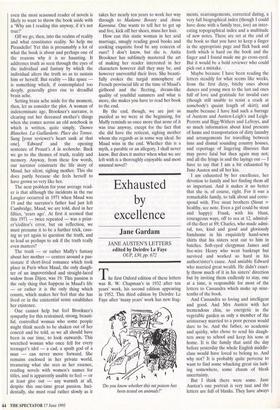Open lies to cover truth
Teresa Waugh
INCIDENTS IN THE RUE LAUGIER by Anita Brookner Cape, £14.99, pp. 219 The trouble with Anita Brookner's new novel is that you cannot get it out of your mind. Once started upon, it haunts you, follows you down the nights and down the days like the Hound of Heaven, never leaving you alone. It is hard to say exactly why it has this effect considering how infuriating all the characters are, and considering its peculiar structure.
In the 18th and 19th centuries, novelists went to great ends to persuade the reader that what 'they were writing was true and no figment of their imagination — hence the epistolary novels of Richardson and Laclos, and hence Wuthering Heights' uncomfortable construction. Imagine then the dismay of today's reader on learning from the narrator at the very beginning of Brookner's, novel, that everything which follows is untrue. In order then to enjoy this book at all, a willing and double sus- pension of disbelief is required. This, oddly enough, is so hard that throughout the tale, even the most seasoned reader of novels is likely to want to throw the book aside with a 'Why am I reading this anyway, if it's not true?'
Off we go, then, into the realms of reality and what constitutes reality. So help me Pirandello! Yet this is presumably a lot of what the book is about and perhaps one of the reasons why it is so haunting. It addresses truth as seen through the eyes of the individual and fantasy by which the individual alters the truth so as to sustain him or herself. But reality — like space is something which, if contemplated too deeply, generally gives rise to dreadful brain ache.
Setting brain ache aside for the moment, then, let us consider the plot. A woman of indeterminate age, Brookner's narrator, is clearing out her deceased mother's things when she comes across an old notebook in which is written, quite simply, 'Dames Blanches. La Gaillarderie. Place des Ternes. Sang [your reviewer's heart sank at that one]. Edward' and the opening sentence of Proust's A la recherche. Back we go to the themes of truth, reality and memory. Anyway, from these few words, our narrator constructs the life story of Maud, her silent, sighing mother. This she does partly because she feels herself to have grown so very like her.
The next problem for your average read- er is that although the incidents in the rue Laugier occurred in 1971 when Maud was 19 and the narrator's father had just left Cambridge, Maud, we are told, died in her fifties, 'years ago'. At first it seemed that this 1971 — twice repeated — was a print- er's/editor's error, but on reflection, we must presume it to be a further trick, caus- ing us yet again to question the truth, and to lead us perhaps to ask if the truth really even matters?
The truth — or rather Maffy's fantasy about her mother — centres around a pas- sionate if short-lived romance which took place in Paris when Maud, the only daugh- ter of an impoverished and straight-laced widow from Dijon, was 19. This passion is the only thing that happens in Maud's life — or rather it is the only thing which counts, which makes her feel that she has lived or in the existential sense establishes her existence.
One cannot help but feel Brookner's sympathy for this restrained, strong, beauti- ful, controlled woman who some people might think needs to be shaken out of her conceit and be told, as we all should have been in our time, to look outwards. This wretched woman who once fell for every teenager's idol — a cad, a spoilt god of a man — can never move forward. She remains enclosed in her private world, treasuring what she sees as her essence, reading novels with women's names for titles, and is apparently unable to feel — or at least give out — any warmth at all, despite this one-time great passion. Inci- dentally, she must read rather slowly as it takes her nearly ten years to work her way through to Madame Bovaty and Anna Karenina. One wants to tell her to get up and live, kick off her shoes, muss her hair.
How can this static woman in her arid marriage, smugly reading good books and cooking exquisite food be any concern of ours? I don't know, but she is. Anita Brookner has sublimely mastered the art of making her reader interested in her characters however dull they may be, and however uneventful their lives. She beauti- fully evokes the turgid atmosphere of French provincial life at the time of Maud's girlhood and the fleeting, dream-like quality of youthful summers and what is more, she makes you have to read her book to the end.
By the end, though, we are just as puzzled as we were at the beginning, for Maffy reminds us once more that none of it was true anyway, except for the fact that she did have the reticent, sighing mother whom she regards as in some way ideal. So Maud wins in the end. Whether this is a myth, a parable or an allegory, I shall never know. But does it matter when what we are left with is a thoroughly enjoyable and most unusual novel?



































































 Previous page
Previous page